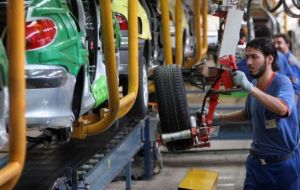MercoPress. South Atlantic News Agency
Mexico rapidly overtaking Brazil as Latam's leading auto producer
 Part of the success is being fueled by auto sales running at the fastest pace in almost eight years in the U.S.
Part of the success is being fueled by auto sales running at the fastest pace in almost eight years in the U.S. Pacific Alliance member Mexico is poised to overtake Brazil, the leading economy in Mercosur, as the top Latin American auto producer for the first time in more than a decade as surging exports to the U.S. spur factory openings and record output.
After nosing ahead of Brazil in the first five months of the year, Mexico is projected to hold its advantage through 2014, for the first full-year lead since 2002, according to consultant IHS Automotive.
Mexico’s ascent is being fueled in part by auto sales running at the fastest pace in almost eight years in the U.S., the country’s largest market. The boom coincides with a slump in Brazilian production through May as domestic demand cools, setting up a shift in leadership of the Latin American industry faster than analysts predicted.
“The wind is in our sails” in Mexico, said Luis Lozano, lead automotive partner at PricewaterhouseCoopers, in a telephone interview from Mexico City. “People talk about the energy and telecom industries in Mexico, but the auto industry is going to continue as the icon of this country.”
Eclipsing Brazil, where output has fallen 14% this year, would vault Mexico to No. 7 among the world’s largest auto producers. China and the U.S. lead the global pack.
This year’s diverging fortunes of Mexican and Brazilian auto production reflect the state of their biggest markets. Brazil-made cars and trucks are too expensive, given high labor costs and taxes, to send abroad and go mostly to local buyers. Mexican factories export eight of every 10 cars they produce -- with more than half going to the U.S.
The auto industry epitomizes the underlying economic fundamentals in the two countries. Mexico is starting to see signs of rebounding after growth missed forecasts in seven of the past eight quarters, while Brazil cut GDP estimates for this year and next and boosted inflation forecasts. Economists project that the Mexican economy will grow 2.8% this year compared with 1.3% in Brazil.
Auto output in Mexico rose 7.2% through May to 1.31 million vehicles, bolstered by new plants for Nissan, Honda and Mazda according to the Mexican Automobile Industry Association, known as AMIA. Brazil’s total was 1.27 million, according to Anfavea, Brazil’s automaker association.
Mexico’s proximity to the U.S. also gives it an advantage, as do labor costs for automakers that are about 20% of U.S. levels, says PricewaterhouseCoopers.
While Mexico’s exports to the U.S. rose 19% through May, Brazil’s shipments to its top trading partner, Argentina, declined 28%, according to Anfavea. Within Brazil, consumers have slowed purchases because of tighter credit and a weakening economy.
Even as exports are buoying Mexico’s auto industry, the low level of domestic sales is a weak spot, according to AMIA President Eduardo Solis. New car sales in Mexico totaled 1.06 million last year. Mexico should restrict used-car imports from the U.S. more stringently, he said.
“We have record production and exports and a domestic market that just isn’t turning the corner,” Solis told reporters in Mexico City.
Mexico is likely to produce 3.1 million autos this year, according to Solis, who said he was unsure whether the nation would build more than Brazil. IHS is forecasting Mexican output of almost 3.2 million, ahead of Brazil’s 3.17 million.
Mexico’s auto-production gains combined with Brazil’s losses may lead to a diplomatic confrontation this year between Latin America’s two biggest economies, according to Augusto Amorim, IHS Automotive’s analyst for South America.
In 2012, Mexico agreed to limit car exports to Brazil for three years after a surge in Mexican shipments to Latin America’s largest economy. That led to a 23% drop in Mexican-made vehicles exported to Brazil last year, according to AMIA.
While the pact is set to expire in March 2015, Brazil may look for ways to extend it, Amorim said. AMIA will probably meet with Anfavea and a similar trade group from Argentina this summer, Solis said.
“The commitment is to get back in 2015 to a free market,” Mexico Economy Minister Ildefonso Guajardo told reporters July 3 in Mexico City.
Automakers’ investments show the importance of both countries in the global production chain.
After the recent Mexico plant openings by the Nissan-Honda- Mazda trio from Japan, a combined investment valued at 4 billion dollars, Germany’s Audi AG is building a 1.3 billion plant to assemble the luxury Q5 sport-utility vehicle.
BMW announced plans last week to invest about 1 billion in a new factory in Mexico, that will produce about 150,000 cars a year. And in June, Daimler and Nissan said they would jointly produce luxury vehicles, including Infiniti compact cars, at a new 1.4 billion factory in Mexico, the biggest project to date in their four-year-old partnership.
“Whatever is made there can be exported,” to any of the more than 40 countries, including the U.S., that have free trade agreements with Mexico, IHS Automotive’s Amorim said.
“When you have Mexico adding a new factory to source the entire world, then you’re talking about big volumes.”
In Brazil, Nissan opened a 1.5 billion complex in Resende in April, and Chery Automobile Co. has a 530 million factory in Sao Paulo state debuting this year, marking the Chinese automaker’s first major investment outside its home country.





Top Comments
Disclaimer & comment rules-

-

-

Read all commentsYes, it's all going steadily downhill for Brazil.
Jul 15th, 2014 - 10:38 pm 0Is anybody at all surprised? No, I didn't think so.
The clue is here: “Mexico is starting to see signs of rebounding after growth missed forecasts in seven of the past eight quarters, while Brazil cut GDP estimates for this year and next and boosted inflation forecasts. Economists project that the Mexican economy will grow 2.8% this year compared with 1.3% in Brazil.”
And is compounded by: “Brazil-made cars and trucks are too expensive, given high labor costs and taxes, to send abroad and go mostly to local buyers.”
This monumental cock-up by the dynamic duo of Dilma and The Liar Mantega will be VERY difficult to turn around.
This is where their messing with Mr. Market has gotten them.
Mexico will be incrementing production by 40% more within the next couple of years and by 2018 it will be the third or fourth largest auto manufacturer in the world. Right now Mexico is exporting cars to Japan, China, US, Europe, Central and South America.
Jul 16th, 2014 - 10:26 am 0Mexico´s plants are also complete plants with supply chains established in the country, not simply assembling lines. For example VW manufactures more than 90% of the car in Mexico, only a few parts are made abroad. Audi is opening a plant to manufacture cars, and to send knock off kits to plants in China and South America where they will only assemble them.
GM, Ford and Toyota have all but shut down production in Venezuela.
Jul 16th, 2014 - 02:46 pm 0Background links here;
http://latino.foxnews.com/latino/money/2014/05/07/ford-stops-car-production-in-venezuela-as-currency-controls-make-parts-tough-to/
http://latino.foxnews.com/latino/money/2014/05/07/ford-stops-car-production-in-venezuela-as-currency-controls-make-parts-tough-to/
http://latino.foxnews.com/latino/money/2014/05/07/ford-stops-car-production-in-venezuela-as-currency-controls-make-parts-tough-to/
http://latino.foxnews.com/latino/money/2014/05/07/ford-stops-car-production-in-venezuela-as-currency-controls-make-parts-tough-to/
So, there you have it.
Free gas, no motors.
Another day in Socialist Paradise.....
Commenting for this story is now closed.
If you have a Facebook account, become a fan and comment on our Facebook Page!